- Home
- Pat Conroy
The Death of Santini Page 16
The Death of Santini Read online
Page 16
“First a cocktail,” Stanny said. “I want to make a toast. I’ll never go back to Piedmont again. I don’t care if Jesus Christ dies there.”
I carried Stanny drunk into her boardinghouse and put her to bed that night. I did that on many occasions, but I was young and strong and was one of those boys who had grown up head over heels in love with his grandmother. As a young writer, I was trying to learn what kind of man I was becoming and what I wanted myself to become in the future. I wanted to ripen into a man I could be proud of—one I could present to the altar of God without shame or hesitancy. I was trying to open myself up to the full experiences of life—not to be judgmental or harsh, but to be curious and always on the alert and ready for every encounter, no matter how bizarre or exotic, I found on the road. I was following the path of the third-grader Margaret Nolen, who married as a young mountain girl, deserted her children when they began to starve, lit out for Atlanta and a new life and found one. Stanny and my mother raised Carol Ann and me to be Southern writers before we knew what one was. We spent our childhoods listening to Stanny describe meeting Masai warriors tending their cattle on the plains of Kenya, watching a school of sharks following the ships she circumnavigated the globe on, visiting a gorilla colony in Rwanda, having an audience with the pope in the Vatican, and always, always her morbid sadness when her ship glided into New York Harbor and her dread of return at the sighting of the Statue of Liberty, proof she would never escape the cloistered margins and limitations of Piedmont. Stanny always had to return and it was always to the same place—just as it is for all the rest of us.
In the late seventies, the forces of Piedmont began a strategic campaign of collusion to draw Stanny back into its adhesive and killing webs. I missed the moment when my mother and her sisters grew tired of me hauling Stanny to one Atlanta party after another. The Peek sisters scolded me for introducing their mother to a Gomorrah-like Atlanta that emphasized sin, happy hour, and ungodly goings-on. After the novelist Terry Kay took me around to various strip shows he covered for the Atlanta Journal’s entertainment section, I took Stanny on the same tour the following month. Some of the strippers remembered my name and made a big fuss over Stanny, who was courtly and attentive to them. We ended the night at a huge gay bar on Monroe Drive, where we watched an elaborate dance of the drag queens. Stanny and I danced the night away until we could barely stand. I consider that night among the drag queens as one of the finest nights my grandmother and I spent in our rich and unusual life together. But I will always believe Bernie Schein was the one who provided the catalyst and produced the dangerous chemical reaction that drove Stanny into exile from her Atlanta life.
• • •
No matter how hard Stanny tried to guilt-trip or cajole me, I never took her to Greenlawn Cemetery to communicate with the dead again. I told her I wouldn’t take her back there if every dead person she knew had undergone a resurrection and all were ready to receive Stanny and chant heavenly songs and any daily gossip they might have picked up from their vantage point on Jesus’s knee. Bernie Schein overheard this skirmish with delight and said, “What a no-good white-trash grandson Pat turned out to be, Stanny. What kind of Southern boy is it who won’t even take his beloved grandmother to the cemetery to visit her loved ones? You deserve a much finer grandson. Someone just like Bernie Schein—sensitive, caring, loving, dutiful, and handsome. Not like that Irish lout, that uptight ingrate who doesn’t know how to worship a wonderful woman like you.”
“Shut up, Bernie,” I suggested.
“Will you take me to the cemetery tomorrow, Bernie?” Stanny asked, sealing the deal.
“Of course I will, Stanny. It’ll be an honor. It makes me sick to my stomach that you produced such a sorry grandson. You deserved one just like me … a true hero, a gentleman, a Jew.”
Bernie and Stanny took off the next day with the enthusiasm of big-game hunters setting off to intercept the migrating hordes of the African bush. Their ill-conceived safari among the Southern dead became the stuff of family legend, and both of them would tell their different versions of the story for the rest of their lives. Since Bernie was a small-town boy, I knew that the only cemetery he was familiar with was the diminutive Jewish cemetery on Bladen Street in Beaufort. Later, he admitted that the sheer size of Greenlawn Cemetery had unnerved him as he entered its gates and saw the vast acreage of the tombstones reveal itself to him in all its green, well-ordered silence.
“I didn’t know there were that many dead people in the world,” Bernie declared. “It never occurred to me that more people have died in Atlanta than at Auschwitz.”
From past experience, I knew that Bernie’s problems were only in the beginning stages. Stanny’s eyesight had deteriorated in recent years so that her eyes bulged in geckolike protrusions. She had a heroic incapacity for navigation and as little sense of direction as anyone I ever met. Like most men I know, she would never admit that she was lost or had no idea where she was going. Twice, Bernie had circumnavigated the cemetery, waiting for Stanny to tell him where to park the car.
“Stop right here, Bernie,” Stanny said, pointing to a hill covered with marble stones.
“Is this where your folks are buried?”
“Yes,” Stanny said, “I can feel it, and I can hear my son, James, calling out to me.”
“What’s he saying?”
“He’s not saying nothing, Bernie,” she explained. “He’s just telling me he’s right over there.”
For the first hour they wandered about in a fruitless search for some poor lost Nolen or Peek. Bernie read the names of a hundred tombstones as Stanny moved in her tortoiselike gait to other pastures of stone. Then Stanny announced she could not walk another inch. When Bernie observed that they were half a mile from his car, Stanny shrugged her shoulders with indifference and said, “Just call Pat and tell him where you deserted me and he’ll come pick me up.”
“That son of a bitch would never let me forget it,” Bernie said. “Get on my back, Stanny. I’ll carry you up that hill. Just like Jesus carried that cross up the hill. Holy God, you’re heavier than that cross. You feel like you weigh a thousand pounds.”
“I’ve always been considered petite, Bernie. You make me feel like a pig.”
When Bernie filed his report on the afternoon, he spent the next hour as a pack animal bearing Stanny’s weight from grassy hill to grassy hill. She would issue orders to bear right or left as she kept hearing her son calling out to her again and again. She kept telling Bernie they were getting closer and she had started hearing her dead relatives cheering on their efforts to find them in the great jigsaw puzzle that had enclosed them in a dazzle of names. Coming to the point of breakdown himself, Bernie finally had an idea to extricate himself from his excruciating ordeal.
“We found it, Stanny. We finally found it. James Peek. How wonderful,” Bernie lied.
Stanny mentioned the names of five relatives buried near James, and Bernie shrieked, “Hallelujah, we found them all, Stanny. It’s the prettiest spot in the cemetery, and goddamn, darling, we’ve seen every one of them. Now, you pray your ass off to James right here; then we’ll make like horseshit and hit the trail.”
Stanny dismounted and Bernie claims he fell face-forward into the grass and lay there for several minutes, his body cramping in muscles he wasn’t aware of having.
The light was too bright for Stanny and sweat was pouring down her face as she began her long soliloquy with her son, James. I had endured a few of these long-winded conversations with the lost soul of my uncle and had memorized every portion of the drill.
Stanny began, “Hey, James, it’s me again, your mother. But you know that. You’re in heaven now and I guess know everything. I talked to your wife, Chris, the other day and she told me what your boys were all doing. Steve’s got a good job for himself and Paul got himself married the other day. She seemed like a nice girl, but the marriage was annulled after twenty hours, so I’m guessing they didn’t get along that well. Don Conro
y took me to a Braves game the other night, but the other team won. It was a pretty night, and the stars were all out. You forget that stars still shine on Atlanta.”
Bernie raised his head from the grass, curious about this strange aspect of Christian faith that he had never imagined. He listened as Stanny went over each and every family member who would hold interest for Uncle James, then took it to higher and more personal realms.
“Enough about me and the family. I hope you are doing well, James, and that Jesus is taking good care of you and that the angels are serving you breakfast in bed every morning.”
“Jesus is the nicest guy I ever met, Mother,” said Bernie, answering for my uncle James. “In fact, he reminds me of that great, great American Bernie Schein.”
This interference in her train of prayer stopped Stanny in her tracks for a few seconds; then she continued her conversation with her son. “Do you get to see Jesus very often? Do you have long talks? Do you tell him about the family? Does he know about me?”
“Mother, I talk to Jesus all the time. Hell, to tell you the truth I get sick of him every once in a while. That boy runs his mouth way too much. I think he got the big head, you know, being God and all that stuff. But he tells good stories. I’ve got to hand him that.”
“Does Jesus ever talk about me, James?” Stanny asked.
“All the time, Mother. Hey, he’s right here. Jesus, would you say hello to my mother? They call her Stanny.”
“Jesus?” my grandmother said.
“Hey, Stanny. How you getting along, cupcake? You sure got a great set of jugs for an older woman, if you know what I mean, hon.” Bernie, whose perversity was limitless as far as I knew, realized he had gone a bit far in his sacrilegious imitation of Christ, and said, “No, Stanny, James and I pray for you every night. He can’t wait for you to get up here so we can get to know each other better. You know, go out for a few drinks, tell a few lies, relax and kick back.”
“So I’m going to heaven, Jesus?” she asked.
“You’re going to be in my lap the second you die. And I’m not just whistling ‘Dixie,’ sweetheart. All your friends and relatives are coming up to live with me in heaven. Especially that fabulous guy that I love more than any other creature on earth, that king of personality, that pure delight—who else but Bernie Schein. Of course, his friend Pat’s gonna burn forever in hellfire. I’m going to smite his sorry ass for all eternity. His screaming, moaning, and wailing gonna be music to my ears.”
From the front window of my house on Briarcliff Road, I watched as Bernie and Stanny drove up the driveway. It was seven in the evening when they arrived home, and they’d been gone for more than five hours. Bent double, Bernie staggered out of his car and, with movements resembling a hurt beetle, he went and retrieved Stanny, letting out an audible cry of distress when he lifted her onto his back and walked her up the stairs leading to the front door. When I lifted Stanny off his back, Bernie crumpled to his knees, his whines both pitiful and aggrieved. Though Bernie had never suffered from back problems in his life, Stanny presented him the gift of sciatica for his generous offer to take her to visit Uncle James at Greenlawn Cemetery. When I helped Bernie inside, he told in profane detail what had occurred on his field trip with Stanny. When he finished, Stanny told her own fanciful, sanitized version of the day’s events. As they talked, the story began to build and change, as all great stories do.
• • •
After my separation from Barbara, I moved to an apartment in Ansley Park, where I had yet another breakdown following the publication of The Great Santini. I loved Barbara’s explanation to our families about the failure of our marriage: “When I said my wedding vows, I said ‘richer or poorer.’ I didn’t say a damn thing about crazy.” It was the third breakdown I’d suffered, and there would be three more before I finished with them or they finished with me. Though I had written my novel as a way of trying to save myself, the screams of the hurt boy I had been still echoed in the deep well he fell in when I became a man. The stories I hadn’t told or was afraid to tell were the ones that were killing me. My course and my history as a writer were now set in granite—my work would be father-haunted and emotional enough to ward off these exhausting bouts of madness.
But there was much more to my divorce from Barbara than I ever admitted to either Barbara or myself. It had never occurred to me that when I started writing books it would make me more attractive to smart and pretty women, or that they would want to sleep with me. That I would cheerfully agree to do so came as one of the great surprises of my young manhood. I thought I’d be a much finer man than I turned out to be. But I brought a real sense of endangerment to these affairs and couldn’t sleep with a woman unless I fell somewhat in love with her. Though I tried discretion and restraint, in the end my marriage with Barbara failed because I was an asshole. I hurt a fine woman and cast an intricate web of grief over the lives of my three daughters. The marriage came apart because I fell in love with a flashy, dark-eyed woman from the Dominican Republic named Maria Margarita Jimenez-Grullon. She was intellectual, hilarious, and politically situated somewhere between Mao Tse-tung and Pol Pot. Conversation was a runaway train in her presence, so much so that she would stamp her foot to make a point. Barbara overheard a conversation I had with Maria Margarita and wisely declared the end of our marriage. By then, I had gone to the dark place that more and more seemed like home to me. I lost Barbara and I lost Maria Margarita; and on a devastating, inexplicable rebound, I married Lenore Fleischer, who would teach me everything about life and love that I did not want to know.
When I told Stanny that Barbara and I were getting a divorce, she surprised me by saying, “I just don’t believe in divorce. Never have.”
“You?” I said. “Stanny, I thought you invented divorce.”
“I admit I did it a few times,” she said. “But I never believed in it.”
Stanny’s second life in Atlanta proved to be stormy and short-lived. My aunts Helen and Evelyn disapproved of the sinful, Bohemian life I was subjecting Stanny to as I tried to entertain her in the increasing solitude of her old age. But events began to conspire against my old girl and she was kicked out of two more boardinghouses for drinking. By 1980, my aunts had managed to move Stanny back to Jacksonville, Florida, where she lived out most of the rest of her life with Uncle Joe and Aunt Evelyn. When she could no longer care for herself, they exiled her to a nursing home in Orlando, where Aunt Helen visited her every day. When I stopped by to see her on a book tour, she screamed at me, “If you love me enough, Pat, you’ll get me out of this goddamn hellhole!”
I didn’t love her enough. It is a final, unbearable judgment I pass against myself. I should have moved Stanny into my house and taken care of her forever. Because of my intemperate youth, my selfish spirit, my wildness and years of breakdown, I failed to do the right thing. Stanny’s long-ago flight to Atlanta amidst the suffering of the Depression was the great blow of her liberation from my mother’s entire family. There was boldness and madness in her escape from a poverty she found ruthless to her children and humiliating to her. Heedlessly, she abandoned her children at the most desperate moment of their lives and tore out for the big city to find a radiant life, full of possibility and hope and danger, for all the rest of us.
Hey, Stanny—you’ll always be my girl.
CHAPTER 10 •
Peg Conroy Egan
I don’t believe in happy families. A family is too frail a vessel to contain the risks of all the warring impulses expressed when such a group meets on common ground. If a family gathers in harmony for a reunion, everyone in attendance will know the entry-ways and exits have been mined with improvised explosive devices. The crimes of a father or the carelessness of a mother can defile the taste of oyster dressing and giblet gravy on the brightest Thanksgiving Day. Birthday parties are an abomination. I hated them even when I was a child, especially mine. Long ago, I decided I liked funerals far more than I did weddings. The pretense of being festive at
these events is both crushing and debilitating to me. Feigned happiness and forced bonhomie take a toll on my spirit that deflates me for a week. My parents taught me many things, but they never taught me a thing about faking joy.
Since the melancholy of families has remained a constant theme of my books, I often encounter readers and friends who strive at great lengths to convince me that they emerged from homes of stalwart happiness and unbreakable harmony. Taking care, I always congratulate them on their great good fortune and tell them how lucky and how rare they are in this troublesome world.
The happy family is one of the treasured romances of the American epic, something akin to the opening of the West. All who reveal this truth about their family do so with a conviction and resolution that are always touching to me. Many of my readers have moved me by their recollections and myths of their childhoods, making it seem to me that their families tried as hard as they could to be well rounded and not fragmented, happy and not bereft. Their families always did as well as they could, and that seemed like quite enough for me. I admired these families and their messengers for carrying on the necessary work of making these impossible unions less a curse and more a virtue. A good country springs from these families.
In 1986, I was signing copies of The Prince of Tides in the book section of Rich’s department store on Lenox Road in Atlanta. A large contingent of Peeks and Nolens had driven down from Piedmont for the signing, delighting me with their presence. It was one of the last times I would see any of my mother’s people until Stanny’s funeral. In the middle of the signing, I spotted Dad and invited him to join me as he’d done on other occasions.
Soon after my father took his place beside me, a charming young couple approached the table, a young woman with palomino hair and an opaline complexion, her husband with a face that looked more designed than born into. Their beauty was a celebration of each other, and they bore the look of a young governor and his first lady. We began to talk as Dad took his avuncular time oversigning each book as his own line began to gather.

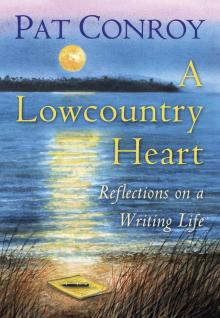 A Lowcountry Heart: Reflections on a Writing Life
A Lowcountry Heart: Reflections on a Writing Life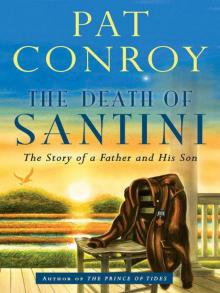 The Death of Santini: The Story of a Father and His Son
The Death of Santini: The Story of a Father and His Son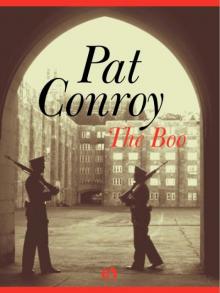 The Boo
The Boo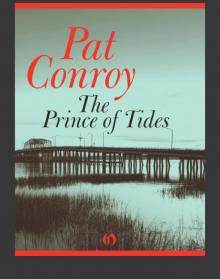 The Prince of Tides
The Prince of Tides Beach Music
Beach Music The Water Is Wide
The Water Is Wide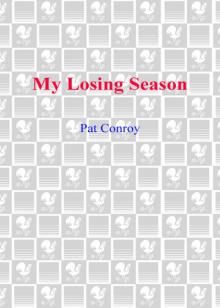 My Losing Season
My Losing Season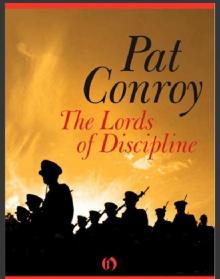 The Lords of Discipline
The Lords of Discipline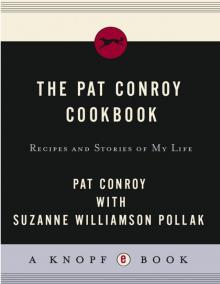 Pat Conroy Cookbook
Pat Conroy Cookbook My Reading Life
My Reading Life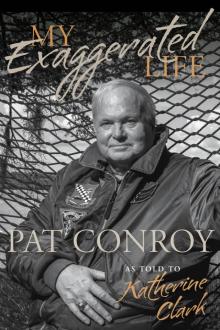 My Exaggerated Life
My Exaggerated Life The Pat Conroy Cookbook
The Pat Conroy Cookbook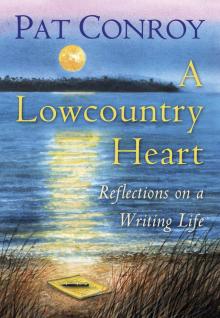 A Lowcountry Heart
A Lowcountry Heart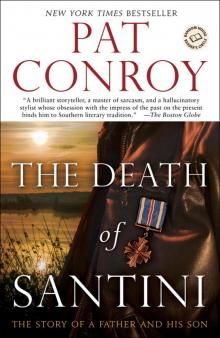 The Death of Santini
The Death of Santini